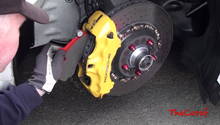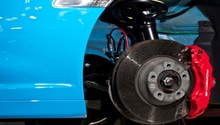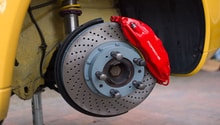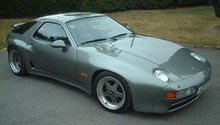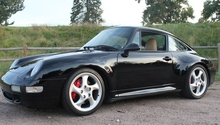Porsche 928: Brake Pad Reviews
When you decide it's time to replace your brake pads, you will be faced with many different options. Here are some of the most popular brands.
This article applies to the Porsche 928 (1979-1995).
Porsche is known for being very fast, which also means these cars must stop fast. Brake pads "bite" the brake rotor while it's spinning and force it to slow down to a stop. Brake pads are exposed to the elements, as well as very high temperatures, which cause brake fade and create brake dust. And while there are tons of options on the market, there are more reputable brands than others.
Depending on your Porsche's application, you may opt for a particular brand of brake pad. Whether you like to hit the race track or just drive your daily commute, there is a special brake pad for you. While some may vary on features, It's always important to choose a brake pad with a good manufacturer's warranty as well as a great price.
Brake Pads
NPN |
Pagid |
Textar |
Wagner | |
|---|---|---|---|---|
Price |
$40 - $55 /set | $55 - $70 /set | $60 - $90 /set | $25 - $35 /set |
Performance |
Street only | Street and moderate track | Street and moderate track | Street only |
Lifespan (based on usage) |
30,000 - 36,000 miles | 30,000 - 36,000 miles | 25,000 - 30,000 miles | 30,000 - 36,000 miles |
Warranty |
1 year or 12,000 miles | 25 months or 25,000 miles | 1 year or 12,000 miles | 2 years or 24,000 miles |
Best Value: NPN
NPN

Price – $40 - $55 per set
Performance – Designated for street driving only
Lifespan –30,000 - 36,000 miles
Warranty – 1 year or 12,000 miles
NPN Brakes were originally produced for the Asian car manufacturers only, but due to their reliability, they quickly became a major player in brake components. Based on feedback from forum members, these brake pads are quiet, reliable, and very smooth. While they are recommended for street driving only, they offer strong stopping power comparable to a track-use brake pad. Recommended if you are looking for smooth, quiet brakes.
Pagid

Price – $50 to 70$ per set
Performance – Street and Moderate Track use
Lifespan – 30,000 - 36,000 miles
Warranty – 25 months or 25,000 miles
Pagid, being the manufacturer of original equipment brake pads for brands such as, Ferrari, Bugatti, McLaren, and, of course, Porsche, doesn't leave much room for accolades. Forum members and long-time Porsche owners speak wonders of Pagid brake pads, mainly because of their versatility of street and track use. If you are looking for brake pads that can still drive you home after a day at the track, then Pagid brake pads will fit the bill. Pagid brake pads also offer the best warranty for brake pads on the market. Recommended if you are looking for street and track pads with a great warranty.
Textar

Price – $60 to $90 per set
Performance – Street and Moderate Track use
Lifespan – 25,000 - 30,000 miles
Warranty – 1 year or 12,000 miles
A brake part producer for behemoth manufacturers such as Chevrolet, Volkswagen, and Toyota, Textar is no stranger to braking technology and is considered one of the top brake manufacturers in the world. That being said, they are known for being smooth and quiet, as well as packaging their brake pad kits with all parts necessary to make the job easier. If you are looking for the best in street reliability for your Porsche, then Textar will do the job. Recommended if you are looking for reliable brake pads.
Wagner

Price – $25 to $35 per set
Performance – Street use only
Lifespan – 30,000 - 36,000 miles
Warranty – 2 years or 24,000 miles
Wagner brake pads have won the "Professionals' Choice Award" four times now; their "ThermQuiet" patented technology makes Wagner brake pads some of the quietest and dependable brake pads on the market. There is a loyal following of Porsche owners to Wagner, as they believe that they offer the next best option to OEM pads for street use only. There have been some reports with certain Wagner brake pad models taking up to 1,000 miles to fully break in and set in. Recommended if you'e looking for street pads similar to the OEM.
Related Discussions and Sites
- Pagid Brake Pads - Pagididracing.com
- NPN Brake Pad Recommendations - Rennlist.com
- Textar Brake Pads - Textar.com
- Brake Pad Comparision - Rennlist.com


